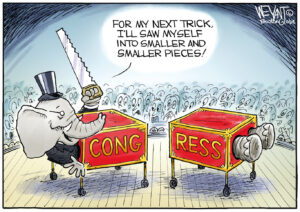Truthdigger of the Week: Rep. Justin Amash
For rattling the first of what hopefully becomes a whole chorus of official sabers against the National Security Agency's indiscriminate domestic wiretapping activities, we honor a Republican lawmaker from Michigan.For rattling the first of what may become a whole chorus of official sabers against the NSA's indiscriminate spying program, we honor a Republican from Michigan as Truthdigger this week.
Every week the Truthdig editorial staff selects a Truthdigger of the Week, a group or person worthy of recognition for speaking truth to power, breaking the story or blowing the whistle. It is not a lifetime achievement award. Rather, we’re looking for newsmakers whose actions in a given week are worth celebrating. Nominate our next Truthdigger here.
This week the White House and the national domestic spying establishment saw its first major attack from Congress when Rep. Justin Amash, a 33-year-old Republican legislator from Michigan, introduced an amendment that could have “end[ed] authority for the blanket collection of records under the Patriot Act.”
It was the first vote by Congress on restricting National Security Agency surveillance after intelligence-contractor-turned-international-fugitive Edward Snowden published details of the government’s spying activities in the Guardian and Washington Post newspapers. The leaked information directly contradicted statements made in recent years by top-ranking intelligence officials on the extent of spying.
In particular, the amendment would have prevented the NSA, FBI and other agencies from relying on Section 215 of the Patriot Act “to collect records, including telephone call records, that pertain to persons who are not subject to an investigation under Section 215.”
Though Amash is widely credited for the amendment, the proposal was actually a cooperative effort between Amash and his Democratic Michigan colleague, Rep. John Conyers Jr., the ranking member of the House Judiciary Committee.
The proposal lost by a narrow margin, 205-217. If passed, it wouldn’t have immediately stopped the government’s dragnet telephone surveillance, but rather would have simply included the amendment in the annual defense appropriations bill. If included, the restriction would have had to clear both the Senate and the White House, where it would have almost surely died.
Though the amendment was defeated Thursday, the size of congressional opposition to the NSA’s bulk surveillance program told the Obama administration that it did not enjoy limitless support on the issue.
The White House lobbied hard to defeat the amendment, casting it as clumsy, ignorant, imprudent and even dangerous.
“This blunt approach is not the product of an informed, open or deliberative process,” White House press secretary Jay Carney said in a statement late Tuesday before the vote. “We urge the House to reject the Amash amendment and instead move forward with an approach that appropriately takes into account the need for a reasoned review of what tools can best secure the nation.”
In an effort to rout growing legislative opposition to the NSA program, agency director Gen. Keith Alexander called an emergency closed-door meeting Tuesday to brief lawmakers on spying activity. Amash, who attended the gathering, described it as cordial but would not give specifics about what was discussed. “I don’t believe anyone’s mind was changed one way or the other,” he said, according to The Guardian.
Amash faced resistance from Republicans and Democrats. That his amendment was allowed a vote was a surprise to some. Republican House Speaker John Boehner and several key committee chairmen opposed the amendment. And Amash has a reputation as an aggressive critic of the Republican leadership because he consistently votes against those leaders and he went so far as to vote against Boehner for speaker.
Nonetheless, in what Politico called an attempt to prevent “truly dividing [a Republican] majority that’s practically duct-taped together,” Boehner let Amash’s proposal see the voting floor. In an article about the NSA vote, Politico gave the impression that Amash’s future in office is uncertain. The site quoted an anonymous Republican as saying: “This kid has made his bed, and he’ll have to sleep in it.” This means “he has crossed leadership so many times that it will eventually come back to bite him,” Politico wrote.
Amash’s opposition to the White House’s violation of Americans’ privacy is put into context by understanding that Amash is a libertarian in the mode of Ron Paul. He endorsed Paul for president in 2012 and has been endorsed by Paul himself. Paul’s brother, who was an assistant pastor in Amash’s district, said of the representative: “I like most of his ideas because I’ve heard them before, you know, the same things Ron talks about.” Amash voted against the 2012 National Defense Authorization Act and co-sponsored an amendment that would ban indefinite military detention and force terror suspects to be tried in civilian courts.
These admirable aspects of contemporary libertarianism are, of course, undergirded by a darker, market-oriented side that would further de-democratize society by defunding and privatizing vital social welfare programs and institutions such as public education while removing virtually all regulations that protect people, smaller businesses, the environment and government itself from the appetites of commercial business.
But for sounding the first of what will hopefully become a whole chorus of official sabers rattling against the U.S. government’s unethical and socially degrading limitless spying program, we honor Justin Amash as our Truthdigger of the Week.
Your support matters…Independent journalism is under threat and overshadowed by heavily funded mainstream media.
You can help level the playing field. Become a member.
Your tax-deductible contribution keeps us digging beneath the headlines to give you thought-provoking, investigative reporting and analysis that unearths what's really happening- without compromise.
Give today to support our courageous, independent journalists.









You need to be a supporter to comment.
There are currently no responses to this article.
Be the first to respond.